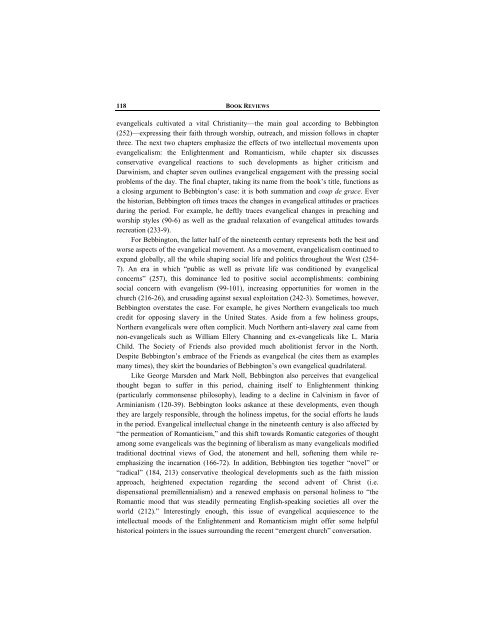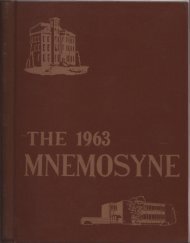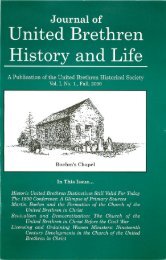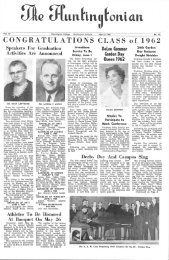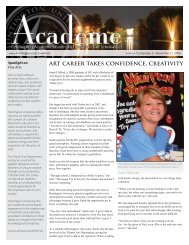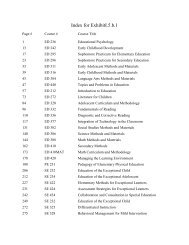Gillian Clark, Christianity and Roman Society - Huntington University
Gillian Clark, Christianity and Roman Society - Huntington University
Gillian Clark, Christianity and Roman Society - Huntington University
You also want an ePaper? Increase the reach of your titles
YUMPU automatically turns print PDFs into web optimized ePapers that Google loves.
118 BOOK REVIEWS<br />
evangelicals cultivated a vital <strong>Christianity</strong>—the main goal according to Bebbington<br />
(252)—expressing their faith through worship, outreach, <strong>and</strong> mission follows in chapter<br />
three. The next two chapters emphasize the effects of two intellectual movements upon<br />
evangelicalism: the Enlightenment <strong>and</strong> <strong>Roman</strong>ticism, while chapter six discusses<br />
conservative evangelical reactions to such developments as higher criticism <strong>and</strong><br />
Darwinism, <strong>and</strong> chapter seven outlines evangelical engagement with the pressing social<br />
problems of the day. The final chapter, taking its name from the book’s title, functions as<br />
a closing argument to Bebbington’s case: it is both summation <strong>and</strong> coup de grace. Ever<br />
the historian, Bebbington oft times traces the changes in evangelical attitudes or practices<br />
during the period. For example, he deftly traces evangelical changes in preaching <strong>and</strong><br />
worship styles (90-6) as well as the gradual relaxation of evangelical attitudes towards<br />
recreation (233-9).<br />
For Bebbington, the latter half of the nineteenth century represents both the best <strong>and</strong><br />
worse aspects of the evangelical movement. As a movement, evangelicalism continued to<br />
exp<strong>and</strong> globally, all the while shaping social life <strong>and</strong> politics throughout the West (254-<br />
7). An era in which “public as well as private life was conditioned by evangelical<br />
concerns” (257), this dominance led to positive social accomplishments: combining<br />
social concern with evangelism (99-101), increasing opportunities for women in the<br />
church (216-26), <strong>and</strong> crusading against sexual exploitation (242-3). Sometimes, however,<br />
Bebbington overstates the case. For example, he gives Northern evangelicals too much<br />
credit for opposing slavery in the United States. Aside from a few holiness groups,<br />
Northern evangelicals were often complicit. Much Northern anti-slavery zeal came from<br />
non-evangelicals such as William Ellery Channing <strong>and</strong> ex-evangelicals like L. Maria<br />
Child. The <strong>Society</strong> of Friends also provided much abolitionist fervor in the North.<br />
Despite Bebbington’s embrace of the Friends as evangelical (he cites them as examples<br />
many times), they skirt the boundaries of Bebbington’s own evangelical quadrilateral.<br />
Like George Marsden <strong>and</strong> Mark Noll, Bebbington also perceives that evangelical<br />
thought began to suffer in this period, chaining itself to Enlightenment thinking<br />
(particularly commonsense philosophy), leading to a decline in Calvinism in favor of<br />
Arminianism (120-39). Bebbington looks askance at these developments, even though<br />
they are largely responsible, through the holiness impetus, for the social efforts he lauds<br />
in the period. Evangelical intellectual change in the nineteenth century is also affected by<br />
“the permeation of <strong>Roman</strong>ticism,” <strong>and</strong> this shift towards <strong>Roman</strong>tic categories of thought<br />
among some evangelicals was the beginning of liberalism as many evangelicals modified<br />
traditional doctrinal views of God, the atonement <strong>and</strong> hell, softening them while reemphasizing<br />
the incarnation (166-72). In addition, Bebbington ties together “novel” or<br />
“radical” (184, 213) conservative theological developments such as the faith mission<br />
approach, heightened expectation regarding the second advent of Christ (i.e.<br />
dispensational premillennialism) <strong>and</strong> a renewed emphasis on personal holiness to “the<br />
<strong>Roman</strong>tic mood that was steadily permeating English-speaking societies all over the<br />
world (212).” Interestingly enough, this issue of evangelical acquiescence to the<br />
intellectual moods of the Enlightenment <strong>and</strong> <strong>Roman</strong>ticism might offer some helpful<br />
historical pointers in the issues surrounding the recent “emergent church” conversation.


